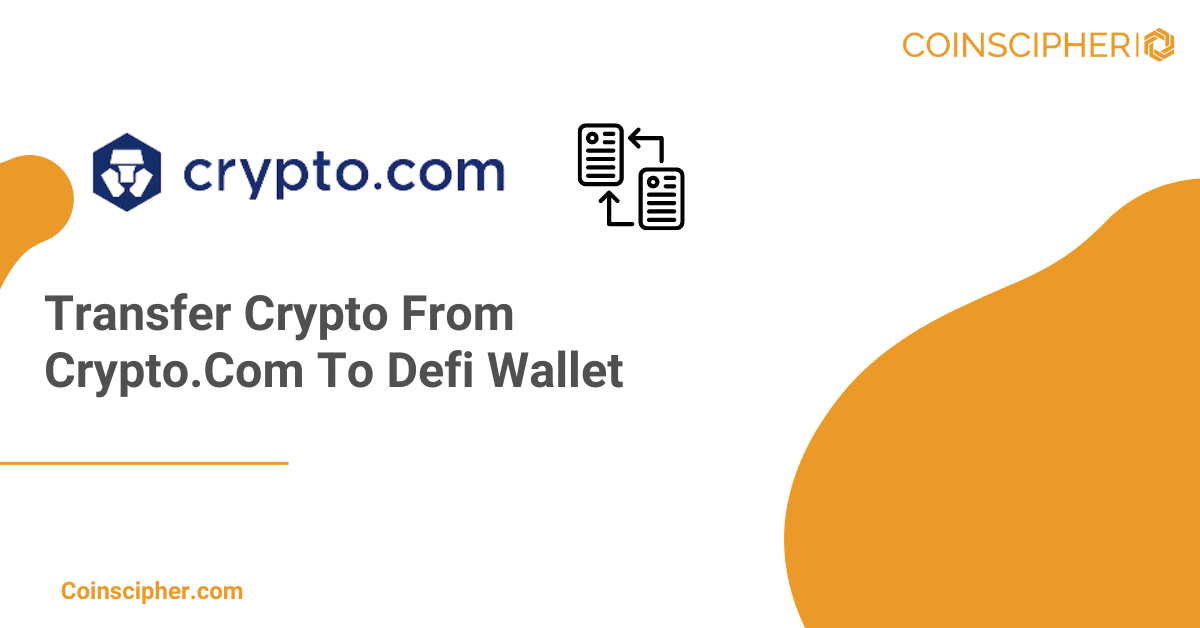In today’s digital era, cryptocurrency has become an integral part of our financial transactions. With different digital assets gaining prominence, it is necessary to understand how to safely transfer these assets. One common transfer that many crypto users perform is moving cryptocurrency from Crypto.com to a decentralized finance (DeFi) wallet.
The Crypto.com platform is regulated, ensuring that your funds are well-protected using the industry-standard digital asset protection mechanisms. However, it’s crucial to ensure that the recipient address is correct before initiating the transfer as any error could lead to blocked transactions or loss of funds.
Read More: Bridging Metamask with PayPal
How to Secure Your Cryptocurrency Transactions
The first line of defense in securing your crypto transactions is to keep your device updated with the latest software. With new hacking methods constantly emerging, the latest software updates provide the highest level of security. Besides, using a secure and reliable wallet like the Trust Wallet can enhance your transaction security.
When transferring your crypto, remember to double-check the recipient address and the type of cryptocurrency you’re sending. A small error could lead to a loss of your digital assets. Also, consider doing a test transaction with a small amount before transferring larger sums.
Cryptocurrency Wallets: More Than Just a Storage
When considering the storage and transfer of cryptocurrencies, understanding the functionalities of a crypto wallet is crucial. Contrary to traditional wallets, crypto wallets do more than just store your assets. They facilitate transactions by interacting with various blockchain networks, enabling you to send or receive different cryptocurrencies.
Crypto wallets store your public and private keys, which you need to perform transactions. Here, the private key is like your digital signature, providing proof of ownership and allowing transactions to be completed. A good wallet should ideally offer strong security features for your private keys, providing robust protection against potential hacks.
Cryptocurrency Hardware Wallets: Enhancing Your Transaction Security
Cryptocurrency hardware wallets offer an added layer of security by storing your private keys offline or in “cold” storage. By requiring physical confirmation on the hardware device to complete a transaction, hardware wallets reduce the risk of unauthorized transactions, even if your computer is compromised.
Moreover, some hardware wallets come with sophisticated security features, including biometric authentication and tamper-proof seals. These features, combined with the ability to directly manage your transactions, make hardware wallets a preferred choice for many crypto enthusiasts.
Read More: How To Bridge Assets From BSC To Ethereum
Transferring Cryptocurrency from Crypto.com to DeFi Wallet: Step-by-Step
Here’s a simple step-by-step guide to transfer cryptocurrency from Crypto.com to a DeFi wallet:
- Open your Crypto.com account and select the wallet that contains the cryptocurrency you want to send.
- Choose the specific cryptocurrency and select the ‘Transfer’ option.
- Enter the recipient’s wallet address, i.e., your DeFi wallet address. Ensure that the address is correct.
- Input the amount of cryptocurrency you wish to send and confirm the transaction.
- Wait for the transaction to be processed. The transfer speed will depend on the blockchain network’s congestion level and the transaction fee you’re willing to pay.
Always remember to double-check the recipient’s address and the type of cryptocurrency you’re sending to avoid any mishaps.
Best Practices for Crypto Wallet Security
- Regular Software Updates: Ensure that your device’s software is up-to-date. Regular updates help counter new hacking techniques, enhancing your wallet’s security.
- Strong Passwords: Use strong and unique passwords for your wallet. Consider using a password manager to securely store your passwords.
- Two-Factor Authentication (2FA): Enable 2FA on your wallet for an additional layer of security. This requires verification from a second device to confirm transactions.
- Cold Storage: Consider using hardware wallets or other forms of cold storage for large amounts of crypto, as they are less vulnerable to online hacks.
- Backup: Always backup your wallet to ensure you can recover your assets if your device is lost or compromised.
By following these best practices, you can significantly improve the security of your cryptocurrency transactions.
Recommended DeFi Wallets
Choosing a DeFi wallet that suits your needs is as critical as making your first crypto investment. Here are some of the recommended DeFi wallets that have garnered trust and positive reviews within the cryptocurrency community:
- MetaMask: Known as one of the best DeFi wallets, MetaMask acts as a bridge that allows you to run Ethereum DApps right in your browser without running a full Ethereum node. It’s a browser extension available on Chrome, Firefox, and Brave Browser. Its ease of use and integration with popular DeFi platforms make it an ideal choice for many users.
- Trust Wallet: This is a popular choice among DeFi users and for good reason. Trust Wallet is secure, intuitive, and fully compatible with all ERC-20 tokens and supports a wide range of cryptocurrencies. Additionally, it provides a DApp browser for interacting with DeFi platforms.
- Argent Wallet: Argent is a user-friendly DeFi wallet that leverages smart contract technology to provide features like recovery options and automated transaction fee calculation. It’s a mobile wallet that provides easy access to the Ethereum network and its assets.
- Ledger Nano X: A hardware wallet that offers the highest level of security for your crypto assets. It supports a wide array of cryptocurrencies and integrates with many software wallets for increased convenience. While it requires an upfront cost, the level of security it provides is worth the investment for those who hold significant amounts of cryptocurrency.
- MyEtherWallet (MEW): While it’s not strictly a DeFi wallet, MEW has been around since 2015 and is one of the most trusted wallets in the crypto space. It allows you to interact with the Ethereum blockchain directly from your web browser and is widely compatible with other platforms.
These wallets provide a combination of security, ease of use, and compatibility with a broad array of cryptocurrencies and DeFi platforms, making them excellent choices for those looking to explore the world of decentralized finance.
Conclusion
Understanding how to safely transfer cryptocurrency from Crypto.com to a DeFi wallet is essential for all crypto users. Whether you’re a seasoned trader or a novice, it’s important to be familiar with the processes and security practices involved in crypto transactions. With the right knowledge and precautions, you can ensure the safe and efficient transfer of your digital assets. Always remember, the security of your crypto assets lies in your hands, and being informed is the first step towards secure transactions
Crypto.com Overview
Crypto.com is a comprehensive cryptocurrency platform that offers a wide range of services to individuals interested in buying, selling, trading, and investing in digital assets. Founded in 2016, Crypto.com aims to accelerate the world’s transition to cryptocurrency. The platform provides an intuitive interface where users can access a multitude of features, including a crypto exchange, an NFT marketplace, DeFi wallet, VISA card services, and more. With its commitment to security, privacy, and compliance, Crypto.com has attracted millions of users worldwide, solidifying its position as a prominent player in the crypto ecosystem.




